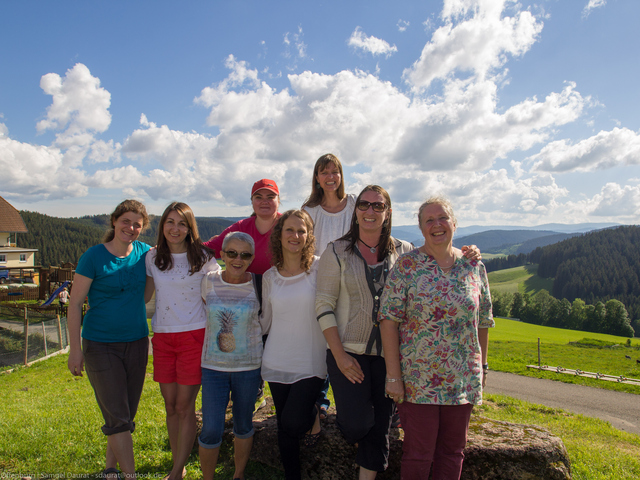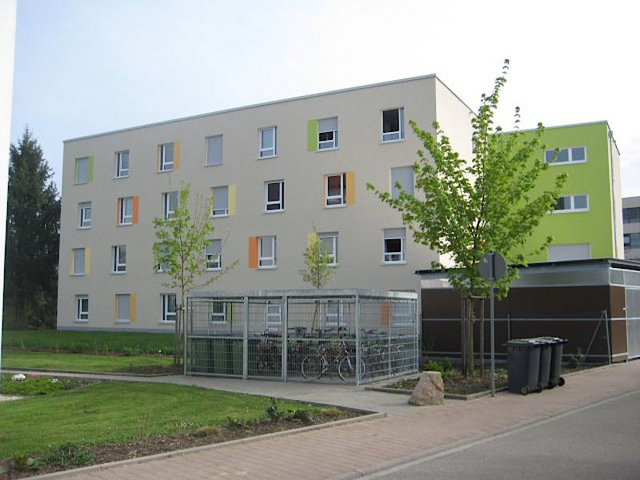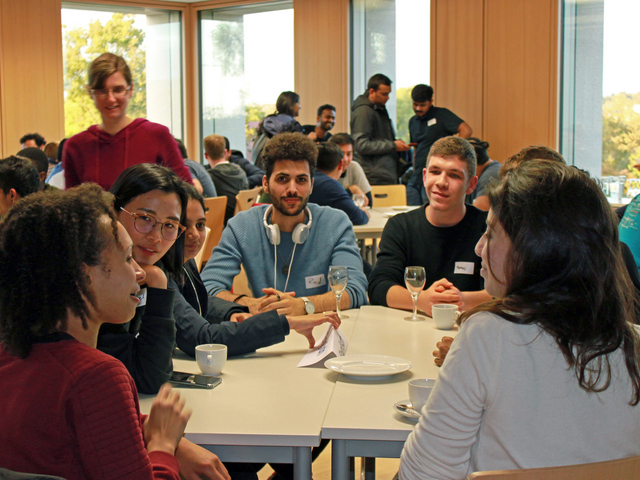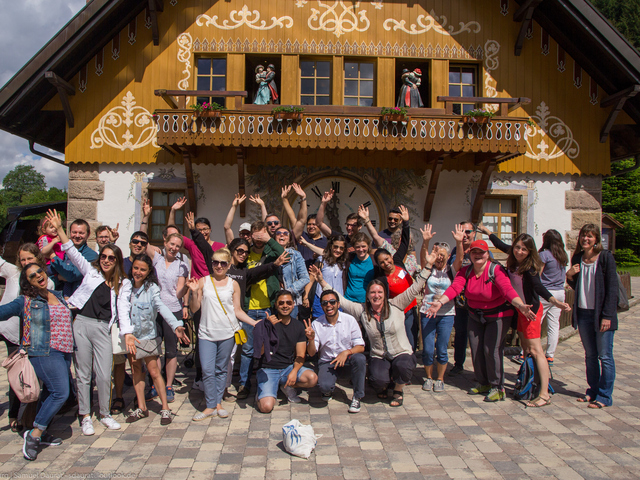M. Sc. Renewable Energy and Data Engineering
What's it about?
One of the greatest challenges of our time is the sustainable supply of energy to the growing world population. This requires a fundamental upheaval of the energy sector worldwide - and can only be mastered with well-trained engineers who help shape these change processes. In concrete terms, efficient energy systems must be planned, built and operated using high-performance methods. The master's program "Renewable Energy and Data Engineering" at Offenburg University of Applied Sciences prepares you for exactly these tasks.
You will learn about solar, wind and water energy, biomass and conventional fuels with regard to conversion into electrical energy. Furthermore, you will acquire knowledge about energy storage, electrical grids, energy applications and energy management. In particular, you will learn the latest methods in energy informatics, data analysis, and power system modeling and simulation.
Many of our professors and teaching assistants have practical work experience in global energy companies, engineering offices or consulting firms.
Through lectures and discussions, students learn all about the current issues in the energy sector. The Renewable Energy and Data Engineering Master's program enables its students to develop a comprehensive expertise in the fields of energy systems and energy management - but always while taking into account all relevant economic, social and political conditions.
Graduates of our program will be well prepared for leadership positions all over the world due to its international orientation.
Der Energiesektor wird immer komplexer, mit einer zunehmenden Anzahl dezentraler Energieeinheiten, von denen viele auf Solar- und Windenergie basieren und daher in ihrem Angebot schwanken. Wir sehen einen Trend zum dezentralen Energie- und Lastmanagement in Verbindung mit Speichern sowie neue Nachfragetypen durch E-Mobilität, Wärmepumpen, LED-Beleuchtung und den zunehmenden Einsatz von Leistungselektronik.
Künftige Stromnetze müssen die Stromversorgung mit weniger konventionellen Großkraftwerken und neuen Leistungsflusssituationen sicherstellen. Es werden neue Marktstrukturen benötigt, die den Bedürfnissen einer wachsenden Zahl von Marktteilnehmern und Stakeholdern gerecht werden.
Diese Komplexität kann nur durch ein tiefes Systemverständnis der verschiedenen Energiesysteme in Kombination mit modernen IT- und Data-Engineering-Methoden bewältigt werden. Im Rahmen des Studiengangs Renewable Energy and Data Engineering lernen, diskutieren und bearbeiten die Studierenden Fallstudien in diesen sich überschneidenden Bereichen.
Im Studiengang wird ein integrierter Ansatz verfolgt, um das in mehreren Bereichen erworbene Wissen miteinander zu verknüpfen. Die einzelnen Lehrveranstaltungen des Studiengangs sind in thematisch zusammenhängende Module gegliedert.
Der Studiengang dauert drei Semester und schließt mit dem akademischen Grad „Master of Science in Renewable Energy and Data Engineering“ ab.
Einen Überblick über den Studiengang und die einzelnen Module sowie eine Kurzbeschreibung der Lehrveranstaltungen finden Sie auf der Seite Studiengang.
A qualification in Renewable Energy and Data Engineering opens doors to fulfillling and successful careers in a wide range of sectors, including the following:
- energy companies with worldwide operations
- international utilities
- regional utilities in Germany
- international engineering companies
- manufacturers of power plant equipment for renewable energy conversion
- grid operators
- energy trading companies
- energy research institutes
- public agencies in the energy sector
- energy management positions in various branches
In cooperation with one of our partner universities, Offenburg University also offers some graduates of our Master's degree programs the possibility to pursue a doctorate, as for example at the University of Freiburg's Graduation School KleE in cooperation with the Fraunhofer ISE institute.

Gabriel Millan
Power Plant Manager - EPEC
"After some years, looking back at my postgraduate times, I cherish moments at Offenburg, not only for the technical knowledge, but above all for the chance to learn from other young colleagues from different areas and cultures and to experience the German way of thinking".

Kivanc Uclertopragi
Chairman - Transpasifik Eberji Mühendislik A.S.
"I’ve always appreciated the multi-cultural environment at Offenburg University which enriched my view of global energy aspects. The cultural diversity at the Graduate School gave us opportunities to analyze different approaches to a wide range of topics".
Are you attracted by our international master's degree Program Renewable Energy and Data Engineering and meet all the requirements? Then you are invited to apply online through HISinOne.
| Degree |
Master of Science (M.Sc.) |
| Language of instruction | English (first semester) and German (second semester) |
| Duration of program | 3 Semesters |
| Beginning of study program | Winter semester (October) |
| Registration Deadline |
March 31st (resident outside the EU) July 15th (resident within the EU) |
| Tuition and fees |
Fees per semester:
€ 1500 state tuition fee for non-EU citizens € 650 state tuition fee for a second degree (only for EU citizens who already obtained a master's degree from a German university) € 150 service contribution € 170 administration fees |
| Requirements | Above-average Bachelor’s degree in Electrical Engineering, Computer Science, Mechanical Engineering, Process Engineering, Energy Engineering or related field, TOEFL iBT 79 or IELTS 6.0 (in each band), German B1, APS (only for applicants from China, India and Vietnam) |
| Internship | Professional experience preferred |
| Selection procedure | Yes |
| Accreditation | Yes |
| ECTS | 90 credits |
Important links
Study and examination regulations
Regulations on the formal course of studies and examinations as well as on the conditions for admission to examinations.
Modul manual
Content description of the teaching fields of the program
Good to know
Students at Offenburg University of Applied Sciences must pay a semester fee for each semester. The semester fee is made up as follows:
- State Administration Fee per semester, €80
This fee does not need to be paid by exchange students from partner universities or special scholarship program students
- Student Services Fee per semester, €65
This fee contributes to the student canteen, student residences, counseling services, student book store and other services offered by the "Studentenwerk"
- Student Representative Organization Fees per semester, €25.
This fee does not need to be paid by non degree seeking exchange students from partner universities or special scholarship program students
- Service Contribution per semester, €150 (only for students studying in one of the English master's degree programs of the Graduate School)
This fee is charged each semester for ongoing services of the Graduate School, such as liability insurance, assistance in finding accommodation, buddies, events and excursions.
- IBC-Program Tuition Fees: €10,400 (for students studying in the MBA-program International Business Consulting). Students of the MBA-program do not have to pay additional State Tuition Fees.
- State Tuition Fee for Non-EU-citizens: €1,500. You are exempted from this tuition fee if
- You are a citizen of the EU and/or the EEA
- Your spouse or one of your parent is a citizen of the EU and/or the EEA
- You have received your qualification of university entrance from the state of Germany
- You are officially recognized as a refugee in Germany
- You are an exchange student from one of Offenburg University's partner universities, or
- You were already enrolled at Offenburg University before the 2017/2018 winter semester
- State Tuition Fee for a Second Degree: €650 (only for students who are not exempted from the State Tuition Fee for Non-EU-citizens and already obtained a master's degree from a Germany university.
This information is supplied without liability. The jurisdiction on the exemption from tuition lies with the Federal State of Baden-Württemberg. For more information please click here.
Payment deadlines will be sent along with the admission letter. Exchange students from partner universities or special scholarship program students need to pay upon arrival.
In Germany, scholarships are usually not granted by the universities themselves but by independent institutions and foundations. The German Academic Exchange Service (DAAD) offers a comprehensive database of scholarships and grants, which must be applied for from your home country before your arrival. Information about funding possibilities are also provided by the European Funding Guide.
Detailed information is also available through the DAAD regional offices, the German Embassy, German Consulate or German Official Representations in your home country, as well as from the specific organizations granting the scholarships.
At Offenburg a very limited number of partial scholarships are also available; applications for these are only open to students enrolled who have shown high academic performance and social commitment outside of class.
In addition, there are a few scholarships for international students, through which they can be exempted from the 1500 EUR state tuition fees for one year. To be entitled to apply, students must be enrolled at Offenburg University for their second semester (or higher) of the respective degree program.
Depending on your preferred lifestyle, average living expenses amount to approximately € 992 per month. Here is a breakdown of monthly expenses:
Rent | 430 |
Health insurance (obligatory) | 132 |
Study materials | 41 |
Groceries | 275 |
Clothing, Public Transport, other | 114 |
Total monthly expenses | 992 |
For more information about the cost of rent, see the accommodation page.
Please note, in the first few days there will be several expenses such as your first rent, deposit, health insurance, etc. Therefore, we recommend bringing with you enough cash to cover these initial expenses.
Students who are EU-citizens are able to work in Germany without a work permit.
Non-EU students have two opportunities:
- Off-campus: 120 days per year, according to visa regulations for foreign students
- On-campus: a limited number of assistantships and tutoring jobs are available
A basic knowledge of German is required for most jobs.
Minimum wage leaflet: In cooperation between the Universities of Applied Sciences and industry and other employers against the background of the Minimum Wage Act - Information for Universities, published by haw-bw.de
- Next steps after admission
- Visa
- Financial Information
- Health Insurance
- Scholarships
- Buddy Program
- Transportation
Once you have been admitted to Hochschule Offenburg, you can use this section as an information source for pre-arrival preparations. Learn more about required documents, study fees and living expenses, accommodation and transportation, and more.
Another great source of information is the DAAD's brochure "Studying in Germany - A Practical Guide for International Students".
Students who come from a country that is not part of the European Union will need a visa to enter Germany and an additional residence permit to study in Germany. Students who are citizens of an EU country will have other entry and permit regulations. You can find out more information about visa requirements by contacting the German consulate in your country.
We recommend applying for your visa three months in advance, because some cases may take longer to process. Also be sure to apply for the correct visa, because you are not allowed to study with a tourist visa.
There is a comprehensive list of information on the German Federal Foreign Office's visa regulations page.
If you need to give a German address for your visa application, and don't know yours yet, you can give the information for Offenburg University of Applied Sciences (Badstrasse 24, 77654 Offenburg).
In order to receive a student visa, foreign students must be able to prove to German authorities that they have enough financial support during their studies. This means, you must prove that you are able to cover at least your first year of studies. Currently, that amounts to € 992 per month, or a total of € 11,904 for a year of study.
There are several forms of proof of financial support, which include a savings book, a confirmation from your bank on the credit balance available, a bank statement, proof of scholorship or a statement of support from your parents. Check with your local embassy to ensure you have the proper documents. In some cases you may be asked by your embassy to open a blocked account called a "Sperrkonto". This is available, for example, via Deutsche Bank, Fintiba or Expatrio. Please note that these are external service providers that are not affiliated with Offenburg University of Applied Sciences.
Please be aware, as it is only allowed to withdraw a certain amount of money per month from these blocked accounts, you will not be able to pay the tuition fees from the money on your blocked account.
Students will be responsible for their living expenses in Germany in addition to their tuition and fees. Before departure, it is a good idea to bring cash for your initial expenses, because a transfer from your home country could take 3-4 weeks. For more information about your first few days, please visit Upon Arrival.
An estimation of students' living expenses in Offenburg/Gengenbach, including a breakdown of the various costs, can bei found in the Costs and Expenses section.
Whoever wants to study in Germany is required to have health insurance. Without health insurance, a student is not allowed to enroll for studies. International students need health insurance upon arrival. Students are eligible for statutory health insurance at a low monthly rate of about € 130,00.
There are some countries within the EU that have agreements with Germany. If you are a student from one of these countries and you already have statutory health insurance from your home country, you may not be required to get additional German health insurance.
It is advisable to purchase traveler's insurance for your first few days in Germany. This way, you will be covered until you obtain your German health insurance.
Some companies, like Fintiba or X-patrio , also offer you to contract both types of insurances together online.
The organization that gives the largest amount of scholarships to international students in Germany, is the German Academic Exchange Service (DAAD). They have an entire www.daad.de/deutschland/stipendium/datenbank/en/21148-scholarship-database/, which you can use to find the best scholarships for you.
We will arrange for a "buddy" to help you settle in during your first weeks in Offenburg. Your buddy will be a student from Offenburg University of Applied Sciences, who will be in contact with you before your arrival in order to ask and answer important questions in advance.
Your buddy will be responsible for picking you up upon arrival, taking you to your accommodation and assisting you in communicating with your landlady/landlord and understanding the lease. Additionally, your buddy will help you with registering at the town hall and the foreign residents office, opening a bank account and showing you where to go grocery shopping. Your buddy will also show you around the campus.
Offenburg University of Applied Sciences has two campuses, both of which are easily accessible by plane, train or car.
- Campus Offenburg
Badstr. 24
77652 Offenburg
Germany - Campus Gengenbach
Klosterstr. 14
77723 Gengenbach
Germany
- location map
Airports
Frankfurt airport is the largest international airport in Germany, with two railway stations: one for within the city, and one for long distances, the "Fernbahnhof". There is a "Fernbahnhof" train directly to Offenburg from Frankfurt airport, and from Offenburg you can take a local train to Gengenbach.
Other nearby airports include: Karlsruhe/Baden-Baden, Basel-Mulhouse (CH/F), Strasbourg (F), Stuttgart and Zurich (CH).
Trains
Offenburg is a railway junction with regular connections to many major German cities, thus making it very accessible. From Offenburg, Gengenbach can be reached within 7 minutes by means of local train.
For information on train schedules and prices, please visit the German railway website.
By Car
Offenburg and Gengenbach are both conveniently located along motorway A5. A map of the Offenburg campus can be seen here, and a map of the Gengenbach campus can be seen here.
- Enrollment
- Opening a Bank Account
- Health and Liability Insurance
- Registration in Germany
- eAT (Electronic Residence Permit)
- GEZ-Fee
- Orientation Events
Once you arrive in Offenburg or Gengenbach, you need to enroll at the University. Exchange students do so at the International Office, Master's degree students at the Graduate School's registrar's office.
Before enrollment, exchange students have to pay their fees at the the University's payment office (room A106 on the Offenburg Campus). Please note that this office accepts cash payments only.
Graduate School students have to have transfered the fees in advance by a given deadline in order for their admission to be valid.
For detailed information about the relevant fees, please see the website on "Costs and Expenses."
Once enrolled, you will receive your registration certificate and student ID, which is called OSKAR (link in German only). The OSKAR card offers a number of additional advantages, such as paying for meals at the campus cafeteria or for the printing services on campus. You will also receive an email account from Offenburg University.
One of the first things you should do after arrival is opening a bank account, because health insurance, rent and other obligations can only be paid by bank transfer.
To open a bank account, bring your passport and the registration certificate you receive at enrollment, so that you qualify for a free student account. Bringing cash will allow the account to be opened immediately, whereas a transfer from your home country could take up to three or four weeks.
There are three main ways of conducting monetary transactions:
- Transfer - used to move money from one account to the other; transfer forms can be filled out by hand at the bank or online
- Standing order - used for recurring payments of a specific amount, e.g. the monthly rent; the bank automatically debits your account on an agreed date
- Direct debit - used for recurring payments of varying amounts, e.g. phone bills; the recipient is given a direct debit authorization to deduct the respective amount from your account.
In Germany most transactions are conducted with cash, especially when paying a small sum of money. Credit cards are relatively common, but not often used for everyday purchases. Instead, people pay more often with debit cards. When you set up a German bank account, you will receive a debit card that you can use at the ATM of your bank free of charge or while you are shopping.
Health Insurance
To study in Germany, you are required to have health insurance coverage. Therefore, before enrolling at Offenburg University you need to provide proof of valid health insurance, i.e. a confirmation that you are covered by a German statutory-health-insurance provider. For more information about the German healthcare system, offered in 10 different languages, please check here.
In general, statutory health insurance companies offer cheaper rates for students, at approximately € 90 per month.
International students from EU countries who have statutory health insurance in their home country can have their insurance coverage recognized in Germany. These students must bring their European Health Insurance Card (EHIC).
Here you can download information about student health insurance.
Liability Insurance
Liability insurance is taken out if you cause damage to someone else or their property. In Germany, you are legally responsible not only for material damages, but also, for example, health damages. Therefore, liability insurance is one of the most important insurances if you travel or live in Germany!
By paying the semester fees, all enrolled students of Hochschule Offenburg are covered by liability insurance. However, this only applies to activities that have a causal connection with your studies and take place on the premises of the University, or are part of a course stated in the study curriculum. Cover is also provided during approved work-experience programs which are part of the study curriculum.
Damages declaration forms and further details on student liability insurance can be found on the website of the Studentenwerk Freiburg.
For students of the Graduate School we take out our own liability insurance, financed by the Service Contribution fee, which also covers damages that are not causally related to the University. Exchange students and others, who are studying in one of the other study programs and/or are not obliged to pay the Service Contribution, are strongly recommended to take out liability insurance on their own, at the cost of € 24 per year.
Germany has a personal registration law which requires everyone to register with their local government office. International students must report to their local foreign-nationals office within one week of arrival and register themselves. At the same office, students requiring a residence permit will have their visas converted into a residence permit for the duration of their studies. EU citizens don't need a residence permit, but are also obliged to register at the registration office and obtain a freedom-of-movement permit (Freizügigkeitsbescheinigung).
Please bring the following documents for registration:
- Your passport
- A passport-sized photograph
- The registration certificate from Offenburg University
- Proof of financial support
- Your signed rental contract
- Proof of existing health insurance
For students living in Offenburg, you must register with the Office for Non-German Citizens (AusländerBüro), which has a website in German only. For students living in other communities of the Ortenau district, including Gengenbach, you must register at the Immigration Office of the Landratsamt (district office).
The opening hours are as follows:
AusländerBüro: Monday-Friday 8:00-12:00 noon, Thursday 1:00-6:00 pm
Landratsamt Immigration Office: Monday-Wednesday and Friday 8:00-12:00 noon, Thursday 1:00-6:00 pm
In the past, a residence permit (German "Aufenthaltstitel") was issued in the form of an adhesive label placed in the ID card or passport. Since 2011, electronic residence permits (eAT) for non-EU nationals have been issued as a separate document in credit-card format.
The permit is equipped with a contact-free chip inside the card on which biometric features (photograph and two fingerprints), ancillary conditions and personal data are saved. Additional provisions relating to the residence permit are no longer printed on a label and stuck into the passport, but saved on the eAT chip and printed on a supplementary sheet that is issued along with the eAT.
Please note that the eAT is only valid for as long as the registered accompanying passport is. Therefore, please make sure that your passport is sufficiently valid or apply for a passport extension in good time. Also, travel to other Schengen-area countries is permitted only after issuance of the eAT.
eAT costs:
- Duration up to one year: € 100
- Duration of more than one year: € 110
- Extension for more than three months: € 80
How and where to get the eAT:
- Pick up the application form from the Ausländerbüro
- Fill out, sign, and return the application form to the Ausländerbüro where you will receive a checklist
- Take the checklist and other required documentation to the Bürgerbüro
- You will receive an email invitation/appointment for fingerprint scanning
- You will receive an email notification when your eAT is ready to be picked-up
Additional information:
The Federal Office for Migration and Refugees has published the booklet “All you need to know about the electronic residence permit (eAT),” which is also available in other languages.
Please be informed that as a resident of Germany you are legally required to pay a monthly fee of €18.36 per household (e. g., per shared apartment) to the Gebühreneinzugszentrale der öffentlich-rechtlichen Rundfunkanstalten (GEZ), a joint organization of Germany's public broadcasting institutions.
‘Per household’ in this context means that if you share an apartment, only one of the tenants has to pay, and it is up to the household members to decide how they divide up the costs. Thus, if you move into a shared place, you should first clarify whether one of the other household members is already paying the GEZ fee.
However, your German roommate(s) might be exempt from the fee because they are recipients of federal financial aid. To be sure, such an exemption does not extend to the remaining household members, who still have to pay the full fee.
If you live by yourself, or if no one in your household has been paying the GEZ fees yet, you are required to register with the GEZ – regardless of whether you are actually using or even able to receive the broadcasts. Note that failure to do so, whether purposefully or by negligence, constitutes a misdemeanor and may lead to fines.
The responsibility of paying the GEZ fees begins with moving in and ends when you move out again and have deregistered your place of residence at the local international office (Bürgerbüro). Hence, when you move out, remember to deregister from the GEZ as well!
For more details, refer to this information sheet by Deutsches Studentenwerk (in English).
At the beginning of the semester, several orientation events are held for international and exchange students, where they get to know the campus, professors and lecturers and fellow students, and have plenty of opportunities to clarify any remaining questions about their studies at Hochschule Offenburg.
For all new students, an Introduction Day is held the day before the beginning of classes, including a welcome address by the Rector. New Master's degree students also meet for several orientation days at a special retreat, often in the Black Forest or at Lake Constance.
You will be notified about all relevant orientation dates and locations before your arrival.
Starting your Studies
In den Fächern Mathematik und Physik bauen die Vorlesungen auf Schulwissen auf. Um Studienanfängerinnen und -anfängern den Übergang von Schule/Beruf ins Studium zu erleichtern, bietet die Hochschule Offenburg Vorkurse in diesen Fächern an, die jeweils zwei Wochen vor Vorlesungsbeginn stattfinden. Die Kurse dienen der Auffrischung und Vertiefung von Schulstoff, aber auch der Einführung in einige Themen, die nicht in allen Bildungsplänen enthalten sind. Vorkurse gibt es auch für einige der Informatik-Studiengänge zur Erleichterung des Einstiegs in die Programmierung.
Neue Studierende sollten die Vorkurse unbedingt besuchen, falls mindestens eine der folgenden Bedingungen auf sie zutrifft:
- Längerer zeitlicher Abstand zur Schulzeit
- Kein Abitur
- Lediglich den Mathe-Grundkurs belegt
- Mathe-Schulnote schlechter als 2,0
- Starker Einsatz des grafikfähigen, programmierbaren Taschenrechners
- Auf-Nummer-sicher-gehen wollen
- schon Mit-Studierende kennenlernen möchten
Mathe-Tests zu Beginn des ersten Semesters zeigen den Vorsprung der Vorkurs-Teilnehmenden gegenüber den Nicht-Teilnehmenden.
Die genauen Termine der Vorkurse gibt es auf der Vorkurs-Seite.
[Translate to English:]
An den Einführungstagen lernen die neuen Studierenden "ihre" Hochschule Offenburg kennen. Unterstützt werden sie dabei vom Team der Hochschulkommunikation, das Semester für Semester ein informatives und abwechslungsreiches Programm für die Studienanfängerinnen und -anfänger zusammenstellt.
[Translate to English:]
Mentor*innen sind Studierende höherer Semester, die den neuen Studierenden in den Bachelor-Studiengängen eine erste Orientierung im Studium geben:
- Wie organisiere ich am besten meinen Studienalltag?
- Wie bereite ich mich auf Prüfungen vor?
- Wo finde ich das Prüfungsamt?
- Wie funktioniert die Oskarkarte?
- An wen kann ich mich bei Problemen wenden?
- Was läuft abends in Offenburg oder Gengenbach?
Bei diesen und vielen anderen Fragen helfen die Mentor*innen den neuen Studierenden weiter. Jedem Mentor/jeder Mentorin ist dabei eine kleine Gruppe neuer Studierender zugeordnet. Die Treffen finden üblicherweise zu Beginn des Semesters organisiert statt, beispielsweise am Einführungstag. Später werden Ort und Zeitpunkt von den Gruppen selbst organisiert.
"Die Mentorinnen und Mentoren werden angeleitet und begleitet, können sich bei Fragen jederzeit per E-Mail an uns wenden und tauschen sich bei Treffen untereinander und mit den Organisatoren über ihre Erfahrungen aus", berichtet Jacqueline Obermann, die das Mentor*innenprogramm des vom MINT-Colleges lange Zeit betreut hat.
In eigener Sache: Das MINT-College ist immer auf der Suche nach engagierten Studierenden, die gern als Mentorin oder Mentor neuen Studierenden den Einstieg an der Hochschule erleichtern möchten. Fragen rund um das Programm beantwortet gern Justine Schindler.
Neue Studierende/neuer Studierender und noch nicht Teil einer Mentor*innengruppe? Einfach eine kurze Nachricht an die Koordinatorin des Mentor*innenprogramms schreiben: sofia.haemmerle@hs-offenburg.de








